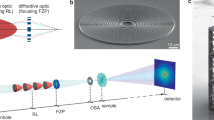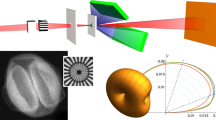Abstract
IT has long been recognized that some of the halos observed on X-ray photographs of liquids and amorphous substances may be spurious and due to the white radiation peak. Some of the observed reflections obtained from concentrated solutions of tobacco mosaic virus1 were under suspicion for this reason, and the use of a nickel filter did not serve to resolve our doubts. Consequently, it was necessary to attempt to use monochromatic radiation. This was achieved as described below. As shown in Fig. 1, the use of monochromatic radiation decisively establishes the spurious nature of the innermost reflection.
This is a preview of subscription content, access via your institution
Access options
Subscribe to this journal
Receive 51 print issues and online access
$199.00 per year
only $3.90 per issue
Buy this article
- Purchase on Springer Link
- Instant access to full article PDF
Prices may be subject to local taxes which are calculated during checkout
Similar content being viewed by others
References
Bawden, Pirie, Bernal and Fankuchen, NATURE, 138, 1051 (Dec. 19, 1936).
Stephen and Barnes, NATURE, 136, 793 (Nov. 16, 1935); 137, 532 (March 28, 1936).
Author information
Authors and Affiliations
Rights and permissions
About this article
Cite this article
FANKUCHEN, I. A Condensing Monochromator for X-Rays. Nature 139, 193–194 (1937). https://doi.org/10.1038/139193a0
Issue Date:
DOI: https://doi.org/10.1038/139193a0
This article is cited by
-
Extinction-free measurements in crystallography
Nature (1976)
-
High intensity neutron diffractometer
Acta Physica Academiae Scientiarum Hungaricae (1963)
Comments
By submitting a comment you agree to abide by our Terms and Community Guidelines. If you find something abusive or that does not comply with our terms or guidelines please flag it as inappropriate.



